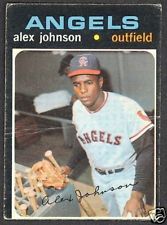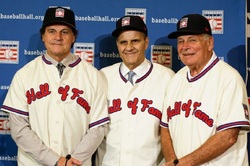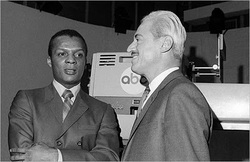
Johnson was caught in a tough situation when he developed a reputation for not playing hard all the time. It was noted in both St Louis and in Philadelphia and even in Cincinnati where he started to establish himself as a solid hitter. We can all relate to a person that has the microscope. That person will always be called out for something because they are always being watched. Another person may do the same thing, but that person will not be treated in the same negative light. From that perspective, Johnson did it to himself. However, it is a fact that he was treated differently- he was treated like a potential problem when he played for the California Angels. Manager Lefty Phillips had a chip on his shoulder and thought fines and subsequent suspensions would get Johnson to hustle. It did not work and on June 26, 1971, Johnson was suspended indefinitely for a series of events which were mostly related to not hustling. Major League Baseball's Players Union leader Marvin Miller threw his support to Johnson and would retrieve some of Johnson's lost pay. However, Johnson hurt his own cause when he stated he, "was not in the spirit to play properly as the whole team was indifferent to play together."
It was determined that Johnson had an emotional disturbance, something that should be treated as a physical ailment. While Commisioner Bowie Kuhn played Johnson on the restricted list after the 30 days had passed, which was the longest a team could suspend a player. Johnson received back pay for all but the 30 days, which came out to $29,970.
Johnson hit over .300 every season in the minors and showed the ability to be a solid MLB hitter. He was on the 1967 Cardinals World Series Championship team though he did not play in the World Series. His two seasons in Cincinnati were by far his best, as he hit .312, 2, 58 with 188 hits in 149 games for the Reds in 1968 followed up by a .315, 17, 88 season in 1969. It was 1970 with the Angels where Johnson enjoyed his best pro season, winning the AL Batting Title with a .329 average with 14 HR, 86 RBI and a career high 202 hits.
Of course, it was the next season where the issues between Johnson and Phillips and GM Dick Walsh came to the forefront. Johnson claimed it was racially motivated, something that could not have been either proved or disproved. The bottom line was the fact that Phillips and Walsh were going to continue to suspend and fine Johnson and Johnson was going to continue to not run hard to first base. You did not need to be a rocket scientist to see this would not end well.
1970 could have been the first of many All Star appearances for Johnson, who was a very good right handed hitter. Losing the 1971 season hurt him and probably affected his 1972 season where he hit just .239 for the Cleveland Indians. Because of the advent of the DH (Johnson had become a very poor defender in the OF) he had a resurgence in 1973 with the Texas Rangers. In fact, manager Whitey Herzog announced publicly that if there was any issues with Johnson's effort, he would be released immediately. Johnson responded by hitting .287, 8, 68 in 158 games as the team's regular DH. Herzog was let go and eventually replaced by Billy Martin as manager. Johnson hit .291 for the Rangers in 1974 but fell out of favor with Martin which led to his trade to the Yankees. He struggled for the rest of 1974 and was a role player on the 1975 team. He was released soon after Martin was named manager of the Yankees in 1975. He hit .266 in 125 games for his hometown Detroit Tigers in 1976, his last in the big leagues.
A debate could be had over how much of what Alex Johnson went through was his own fault and how much was the fault of others. Many of us have been in situations where the microscope is on us, whether some of it is due to our own doing or not. Those of us who have experienced this understand it could be difficult to do to work, knowing every negative action is going to be pointed out. So if you ask me, I do not blame Alex Johnson for what happened in 1971. Does he deserve responsibility, of course, but it was clear the Angels were going after him, creating a situation where no victory could be in sight. Perhaps Johnson could have tried harder to adhere to what he was being asked to do. But if he busted it out of the box for the first 4 ABs and in the 9th inning of a game that has already been decided- doesn't run out a ground ball- the manager is making a big deal out of nothing if he holds this against a player he has already picked a fight with. In my opinion, everybody was wrong in this situation, but the person that suffered the most was Johnson, who lost the season and probably the prime of his career. He could have been a perennial .300 hitter as he had shown over the past three seasons. Instead, we sit here and think over 40 years later, what could have been?



 RSS Feed
RSS Feed
